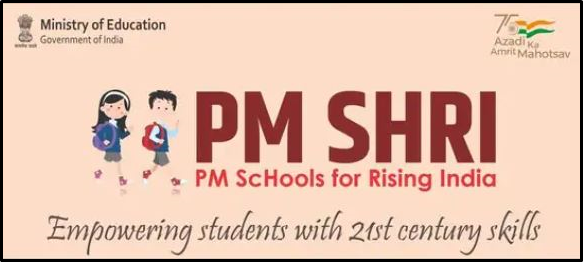PM SHRI Yojana
News
- PM SHRI Schools were introduced in the state by Uttar Pradesh Chief Minister Yogi Adityanath and Union Education Minister Dharmendra Pradhan and the launch ceremony in Lucknow was virtually attended by participants from 928 locations.
- The first phase of the PM SHRI program will upgrade and modernize 928 government schools in Uttar Pradesh, including 81 Kendriya and Jawahar Navodaya Vidyalayas.
- According to Yogi Adityanath (CM, Uttar Pradesh), 1753 schools in the state have been chosen for PM SHRI School upgrades and schools will implement upgrades to their infrastructure, including Baal Vatika, smart classrooms, science labs, digital libraries, and sports facilities and it will lead to the creation of integrated campuses that will offer a comprehensive education.
About PM School For Rising India (SHRI) Scheme
- Announced in 2022, it is a centrally sponsored scheme.
- The goal is to develop more than 14500 schools across the country by strengthening selected existing schools managed by the Central Government, State Governments, UT Governments, and local governments.
- The program will run from 2022–2023 until 2026–2027, at which point the States and UTs will be in charge of continuing to uphold the standards these schools have met.
- Features:
- The chosen schools will serve as role models, exhibiting every facet of the National Education Policy 2020 (NEP) and providing guidance to neighboring schools.
- The PM SHRI Schools will be designed with environmental sustainability in mind, as Green Schools.
- In these schools, the pedagogy will be more experiential, holistic, integrated, inquiry-driven, discovery-oriented, learner-centric, play-and toy-based (especially in the foundational years), flexible, and enjoyable.
- Every child’s learning objectives in every grade will be the main focus.
- All levels of assessment will be competency-based, with an emphasis on conceptual comprehension and applying knowledge to practical contexts.
- Linkages with Sector Skill Councils and local industry will be explored in order to improve employability and provide better job opportunities.
- Key performance indicators (KPIs) that will be used to measure results are being developed as part of the School Quality Assessment Framework (SQAF). Regular quality evaluations of these schools will be conducted to guarantee the required standards.
Source: Newsonair
Disclaimer: All efforts have been made to represent India accurately and as per India government. However, Universal School of Administration, Bengaluru and its associated people do not own any responsibility for the correctness or authenticity of the same.
Please notify on the email: [email protected] if any inconsistency is found for the factual correctness.




